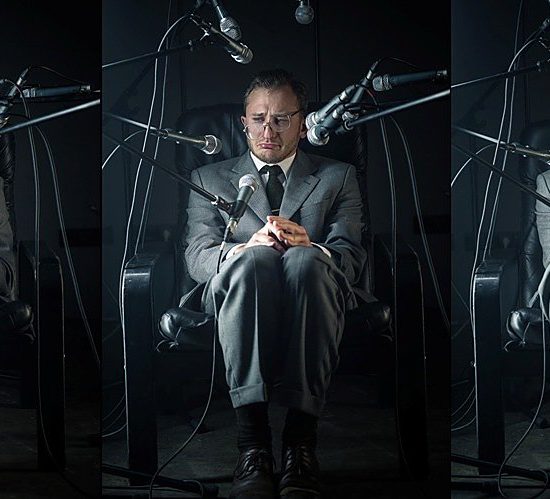The Poem of the Exiled
<…> The play Miranda was a true revelation. The performance is based on The Tempest by Shakespeare. But what Koršunovas has done with it!
The director turned the mysterious island inhabited by the exiled Prospero (Povilas Budrys) and his daughter Miranda (Airida Gintautaitė) into an old Soviet apartment, crammed with funny furniture from the 60’s. On the stage we see dressers, bookcases, a huge radio receiver box and an almost crazy old man with his disabled daughter, whose movements have been transformed into a kind of dance by cerebral palsy. Confined to her chair, she dances, and the dance is just as disgusting as it is enchanting.
Koršunovas creates an entire philosophical sketch about a Soviet dissident-hermit and at the same time about all the people who oppose the government’s control. And while some viewers are trying to accuse the director of an “anti-Russian disposition” or “pro-American pathos”, others, to their surprise, recognize a strange feeling of identification with this Prospero and his daughter. Along with the virtuoso actors and set designer Dainius Liškevičius, the director visualizes the space of our dreams, our hidden and evident desires, forbidden fantasies, and the pain that sits deep inside us. The theatre, which the father opens to his sick daughter, and, more importantly, to himself, is created using the most subtle special effects.
The play begins when the father offers to read a story to his daughter (she insists that he read The Tempest). Subsequently, he fatally plunges into the story by Shakespeare. While the father is drinking the “magic potion”, the girl is transformed into Ariel and what we now see is not a person anymore, but the very spirit of air, crammed into a tiny cavity of the dresser.
We hear Swan Lake in the background, which makes us experience the August of 1991 in a completely different way: as painful intimacy, as the situation of “a person from the underground”, someone who is existentially and historically “bullied”. It is hard to explain how Koršunovas manages to turn on all these unconscious mechanisms. After all what we see is only a tiny flat in a Soviet apartment block and its two miserable inhabitants, exiled to the most distant fringes of today’s life.
To those who saw in this poetically grotesque sketch of the Lithuanian director an example of “anti-Russian pathos” (in the play the hero mimics Gorbachev’s speaking manner, and pulls an “elder brother” Soviet general’s tunic out of the closet), I would like to remind the first moments of the play: not yet knowing what game the director is playing with us, we perceive the poor old man as a “chip” off the empire, banished to the outskirts of Lithuania, Russia, or Europe. And we feel a wave of sympathy not only for the poor heavy drinking man tormented by sorrow, but also for ourselves – people, many of whom also feel rejected. This performance is strongly influenced by psychoanalysis as the ability to open up, to name, and detect the blurred layers of memory. And when Prospero, turned into the young, fashionably dressed Ferdinand, embraces his daughter, it is interpreted not as a naturalistic nightmare, but as a symbolic gesture.
He shall soon collapse on her abandoned chair, become his “Miranda” and quietly die. The more “exiled” art and free thinking is, the more powerful they become – well at least that’s what Oskaras Koršunovas claims by dedicating his play to the “desert islands of the exiled”, which the Soviet Union was so full of. But was it really only the Soviet Union?



